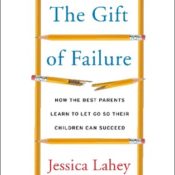The Gift of Failure: How the Best Parents Learn to Let Go So Their Children Can Succeed by Jessica Lahey (Book Excerpt)
 CLEAR EXPECTATIONS AND ROOM TO LEARN
CLEAR EXPECTATIONS AND ROOM TO LEARN
Once your child is in middle and high school and those executive function skills have started to kick in, it’s time to remove your- self from your child’s homework duties. Around the beginning of middle school, when research shows that homework begins to have an academic benefit, homework takes on increasing academic relevance. Homework, when carefully planned and prepared, is not busywork. Quality homework shores up knowledge that has already been encoded, and pushes students to apply that knowledge to new contexts. This final aspect of learning, in which students create answers rather than merely recalling them, is called generative learning. Homework that promotes generative learning offers students opportunities to play with skills, exercise some trial and error, and create their own answers. While generative learning is vital to mastery, it is also hard. Generative learning does not come easily, and when this valuable and precious kind of learning is going on, expect to see some blood, sweat, and tears. It won’t look like elementary school homework, in which answers fit tidily in squares preprinted on math worksheets. Generative learning, when done right, should travel outside the lines, disregard boundaries of subject matter, and stretch students’ abilities to the limit.
I had the opportunity to witness a particularly messy display of generative learning recently when I served as a practice judge for a middle school FIRST Lego League team. FIRST Lego League is an educational robotics program in which teams of kids invent a solution to some problem they have identified out there in the world. When it came time for the students to run through their presentations, I squirmed in my seat and held my tongue as the students tried, and failed, and tried again to communicate solutions to the problems they had identified. It was all I could do to keep from holding my head in my hands as their prototypes failed to work as planned and they argued about workarounds and last-second improvisations these mishaps caused. I was anxious about how they would fare in the real competition the next day, as these prototypes were clearly not ready to be deployed in the real world, let alone in front of a panel of judges. The next day, I received an email from the team’s parent supervisor to thank me for my help and to announce that the kids had received an award for their work. Specifically, they were honored for the way they approached the challenge they were given and for the manner in which they embodied the FIRST Lego League core values. Notably, the core values state, “What we discover is more important than what we win.” All of that failure, failure that nearly gave me an ulcer, resulted in a great learning experience for the students.
In order to take advantage of the more complex generative learning assignments kids face in middle and high school, some students may continue to need guidance where the executive function skills come into play, such as with long-term planning and time management. However, these maturing students should be maintaining their own plan book or calendar and beginning to take responsibility for their work and deadlines. Certainly once high school begins, homework should be completely under students’ control, and unless they want to talk through an assignment or get your feedback on an idea, parents should not be involved in homework at all.
THINK BACK TO YOUR CHILDHOOD, to those days when you simply felt ready for the school day, when you had worked hard on your homework and felt really confident and prepared. Remember those mornings walking to school or riding the bus, when you could not wait for the day to start because you were not just willing to be called on, but eager to show off what you’d accomplished the night before? Keep that feeling in mind when you are tempted to take over your child’s homework. Don’t deprive her of those feelings of competence. Let her experience both her failures and her successes, and let her take ownership and pride in her work and abilities. You can cheer her on as she progresses, but you can’t sit next to her at the dining room table and hold her hand forever. This is her journey, her personal quest to slay her dragons and secure her just rewards.
 Jessica Lahey is a teacher, writer, and mom. She writes about education, parenting, and child welfare for The Atlantic, Vermont Public Radio, and the New York Times and is the author of the New York Times bestselling book, The Gift of Failure: How the Best Parents Learn to Let Go So Their Children Can Succeed. She is a member of the Amazon Studios Thought Leader Board and wrote the educational curriculum for Amazon Kids’ The Stinky and Dirty Show. Jessica earned a B.A. in Comparative Literature from the University of Massachusetts and a J.D. with a concentration in juvenile and education law from the University of North Carolina School of Law. She lives in New Hampshire with her husband and two sons and teaches high school English and writing in Vermont.
Jessica Lahey is a teacher, writer, and mom. She writes about education, parenting, and child welfare for The Atlantic, Vermont Public Radio, and the New York Times and is the author of the New York Times bestselling book, The Gift of Failure: How the Best Parents Learn to Let Go So Their Children Can Succeed. She is a member of the Amazon Studios Thought Leader Board and wrote the educational curriculum for Amazon Kids’ The Stinky and Dirty Show. Jessica earned a B.A. in Comparative Literature from the University of Massachusetts and a J.D. with a concentration in juvenile and education law from the University of North Carolina School of Law. She lives in New Hampshire with her husband and two sons and teaches high school English and writing in Vermont.
Visit http://www.jessicalahey.com/















